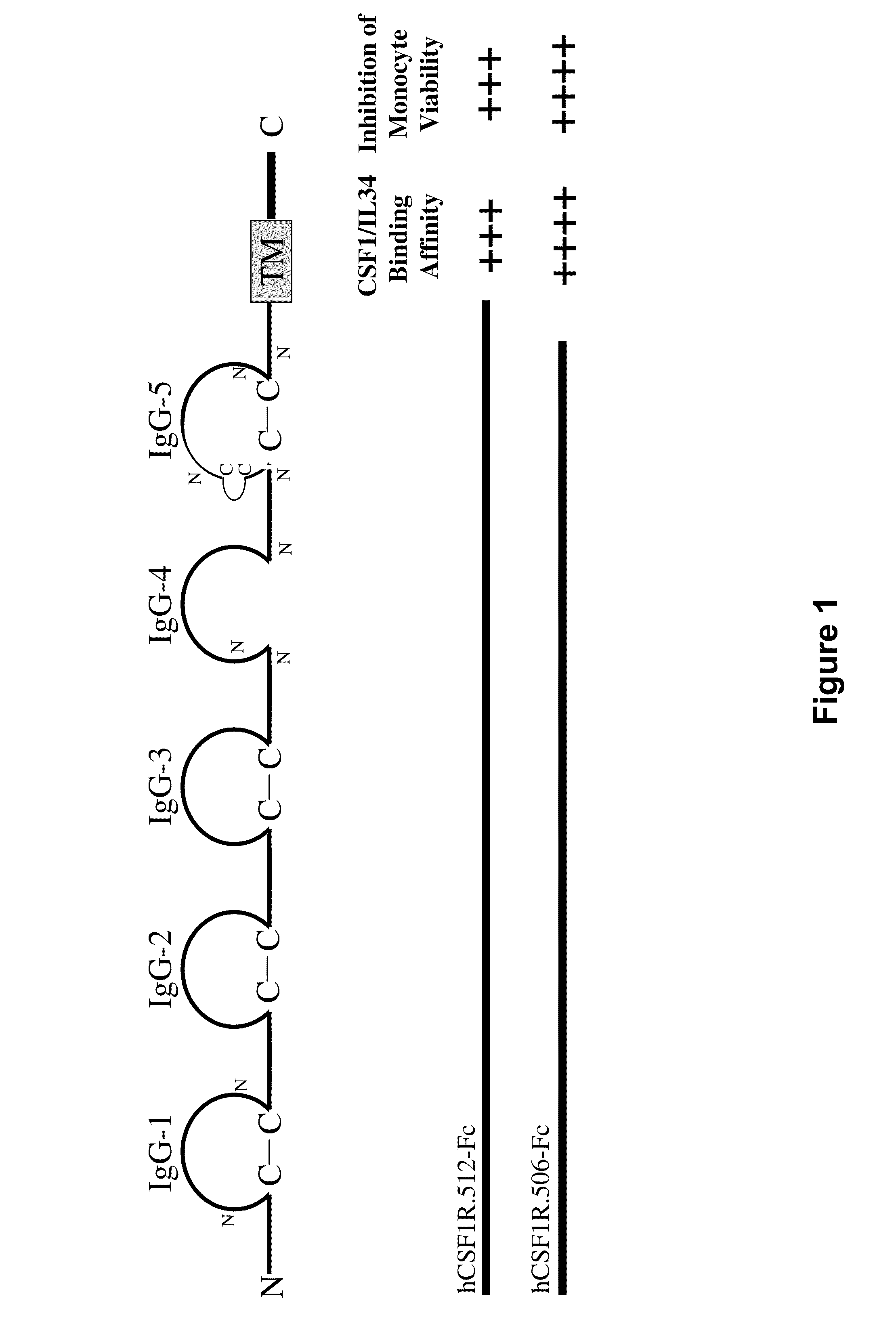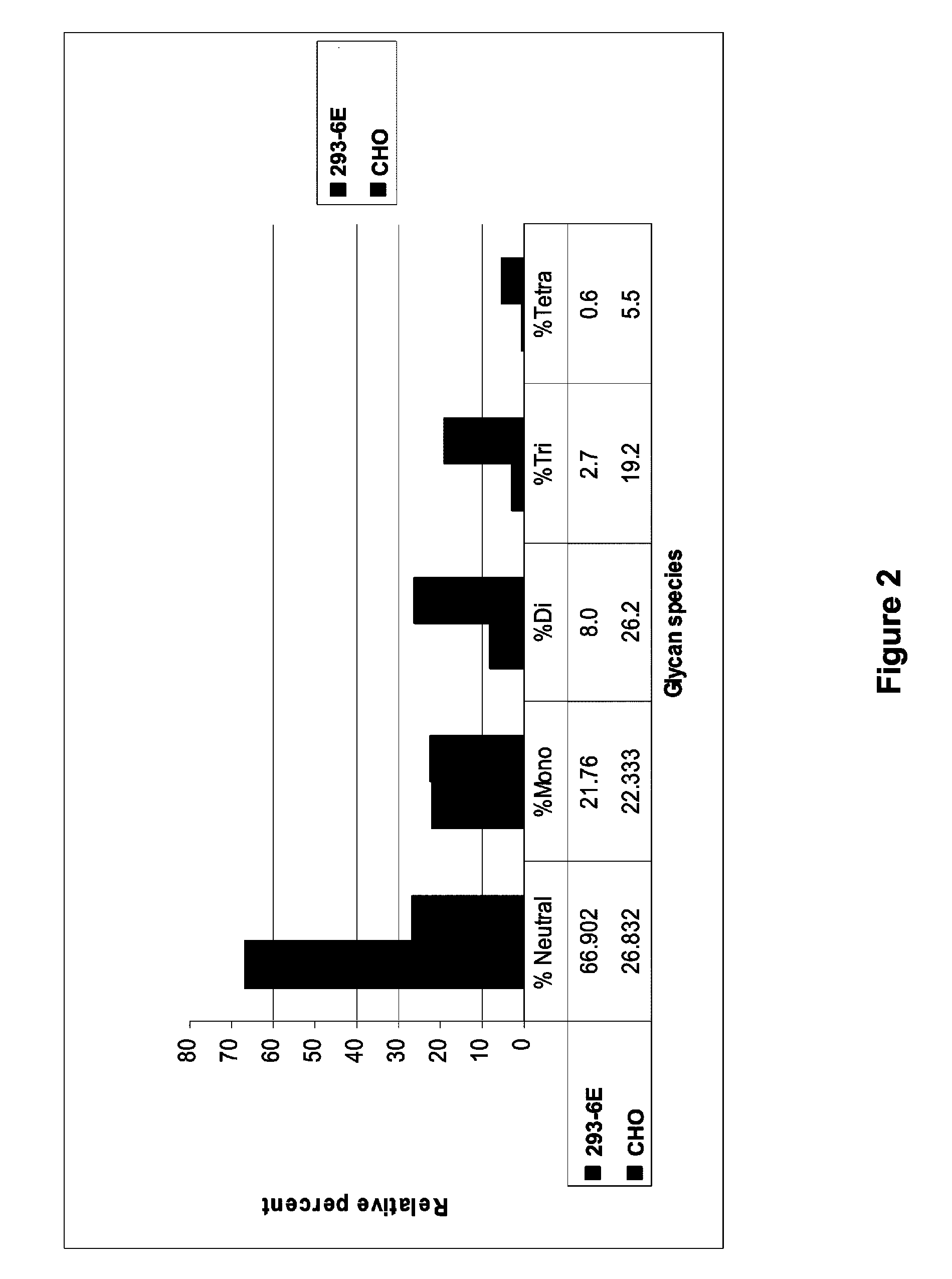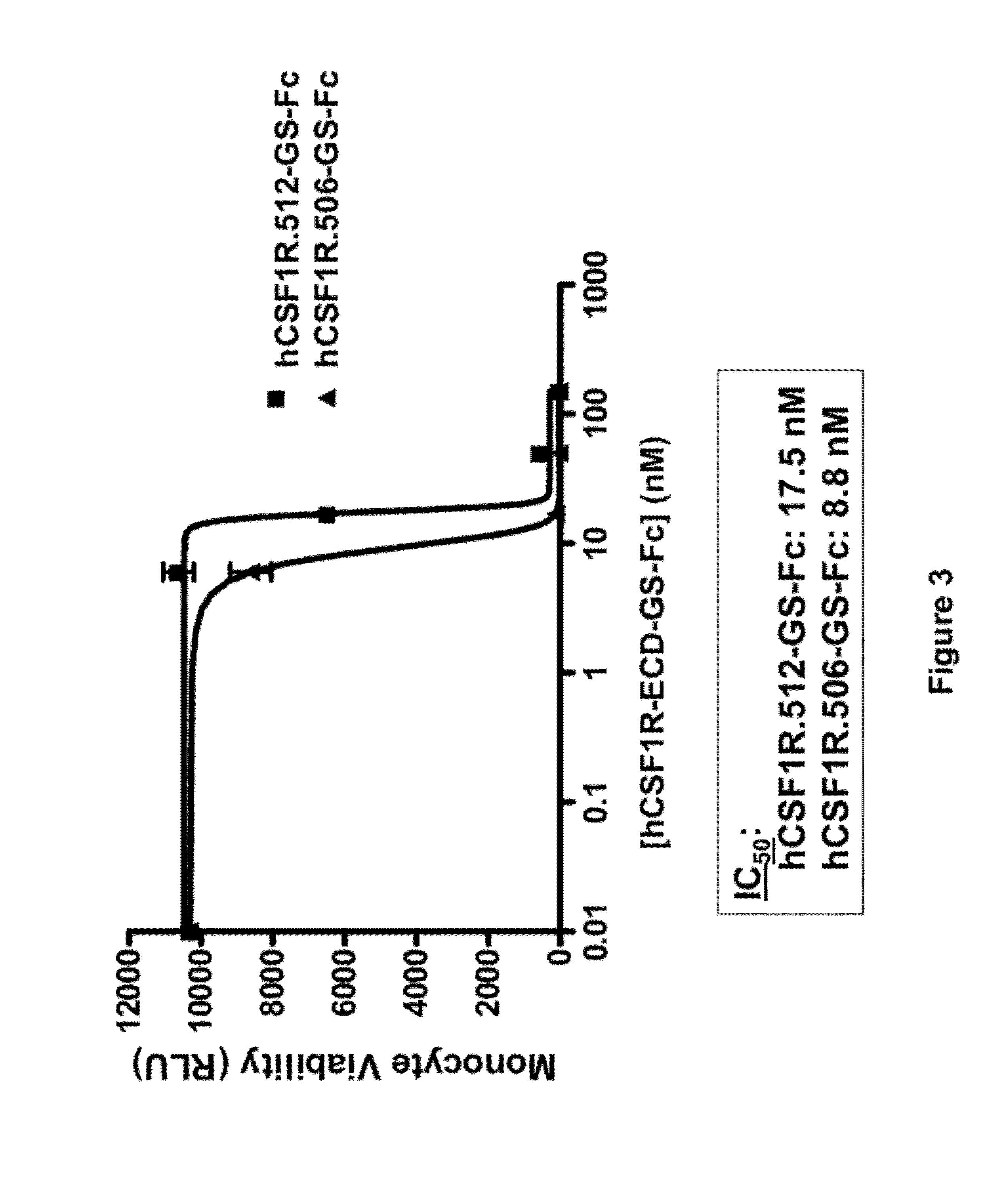Treatment of osteolytic disorders and cancer using CSF1R extracellular domain fusion molecules
a technology of fusion molecules and extracellular domains, applied in the direction of immunological disorders, drug compositions, peptides, etc., can solve the problems of imbalance in levels, pain, spinal cord compression, bone metastases are associated with fractures, etc., to improve therapeutically relevant properties, effectively inhibit monocyte growth, and improve the effect of properties
- Summary
- Abstract
- Description
- Claims
- Application Information
AI Technical Summary
Benefits of technology
Problems solved by technology
Method used
Image
Examples
example 1
Construction of Certain CSF1R-ECD-Fc Fusion Molecules
[0132]The cloning, expression, and purification of the CSF1R ECD fusion proteins are described. Clones of the CSF1R ECD fusion proteins were generated using PCR and conventional subcloning techniques. The GenBank accession numbers for the human CSF1R and mouse CSF1R genes and their encoded proteins are as follows: human CSF1R (NM—005221 and NP—005202) and mouse CSF1R (NM—001037859 and NP—001032948). For use in transient transfection of 293-6E cells, the hCSF1R.506, hCSF1R.512, mCSF1R.506, and mCSF1R.511 cDNAs are cloned into the EcoRI and BamHI sites of the multiple cloning site of the pTT5-J vector. The pTT5-J vector is a modified version of the pTT5 vector (provided by Yves Durocher, Biotechnology Research Institute, Montreal, Canada) that contains a cDNA encoding the Fc region of a human IgG1 protein (amino acid residues 233-464 of GenBank accession number AAH19337) in which the cysteine residue at position 237 is replaced with...
example 2
Expression and Purification of CSF1R-ECD-Fc Fusion Proteins from 293-6E and CHO Host Cells
[0137]In certain Examples herein, the fusion proteins were expressed in 293-6E or CHO cells. The hCSF1R.506-Fc / pTT5-J, hCSF1R.506-GS-Fc / pTT5-J, hCSF1R.512-Fc / pTT5-J, and hCSF1R.512-GS-Fc / pTT5-J plasmid constructs described in Example 1 were designed to provide transient expression in 293-6E host cells. The hCSF1R.506-Fc / pDEF38 and mCSF1R.506-Fc / pDEF38 plasmid constructs described in Example 1 were designed to provide stable expression in CHO cells (or its derivatives, such as DG44 cells (Invitrogen, Carlsbad, Calif.)).
[0138]Small scale production of CSF1R-ECD-Fc fusion proteins was achieved by transient transfection of 293-6E cells grown in polycarbonate Erlenmeyer flasks fitted with a vented screw cap, rotated on a table top shaker at 130 RPM, and grown in Freestyle medium (Invitrogen) at 37° C. in 5% CO2 at cell densities ranging from 0.5×106 to 3×106 cells / ml. Typically, 50 ml of cell cultur...
example 3
Sialylation of the hCSF1R.506-Fc Fusion Protein in 293-63 Cells Versus CHO Cells
[0146]Experiments were carried out to examine glycosylation and sialylation of the hCSF1R.506-Fc fusion protein expressed in 293-6E cells and in the CHO-derived DG44 cells. These experiments showed that the CHO- and 293-6E-produced CSF1R-ECD-Fc fusion proteins exhibited a similar overall level of glycosylation. However, the level of sialylation was higher in the CHO expression system relative to the 293-6E expression system. CHO-produced CSF1R-ECD-Fc fusion proteins exhibited a 10-fold higher level of tetra-sialylated glycans, a six-fold higher level of tri-sialylated glycans, a two-fold higher level of di-sialylated glycans, and a 2-fold reduction in the level of neutral glycans, which are involved in liver clearance. FIG. 2 shows the percentages of neutral, mono-, di-, tri-, and tetra-sialylation in CHO- and 293-6E-produced hCSF1R.506-Fc (corresponding values are shown below the graph).
[0147]Long-term ...
PUM
| Property | Measurement | Unit |
|---|---|---|
| molecular weight | aaaaa | aaaaa |
| molecular weight | aaaaa | aaaaa |
| molecular weight | aaaaa | aaaaa |
Abstract
Description
Claims
Application Information
 Login to View More
Login to View More - R&D
- Intellectual Property
- Life Sciences
- Materials
- Tech Scout
- Unparalleled Data Quality
- Higher Quality Content
- 60% Fewer Hallucinations
Browse by: Latest US Patents, China's latest patents, Technical Efficacy Thesaurus, Application Domain, Technology Topic, Popular Technical Reports.
© 2025 PatSnap. All rights reserved.Legal|Privacy policy|Modern Slavery Act Transparency Statement|Sitemap|About US| Contact US: help@patsnap.com



